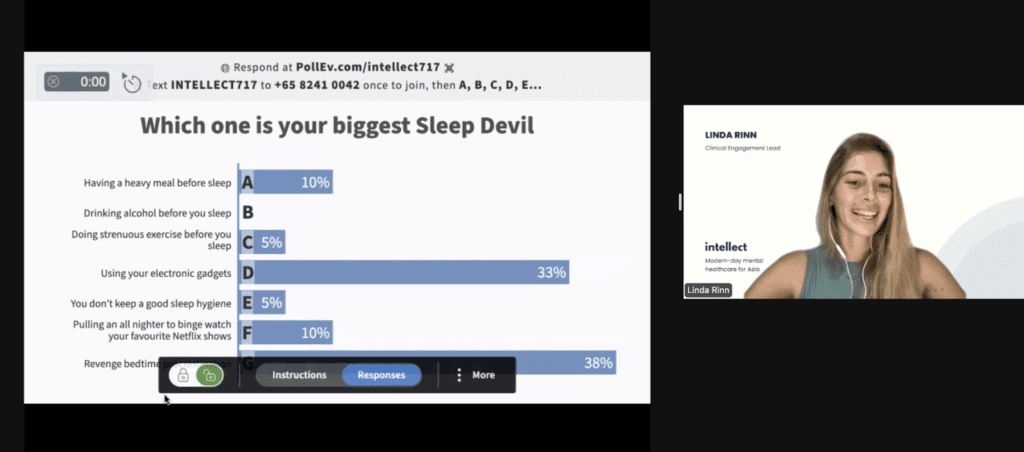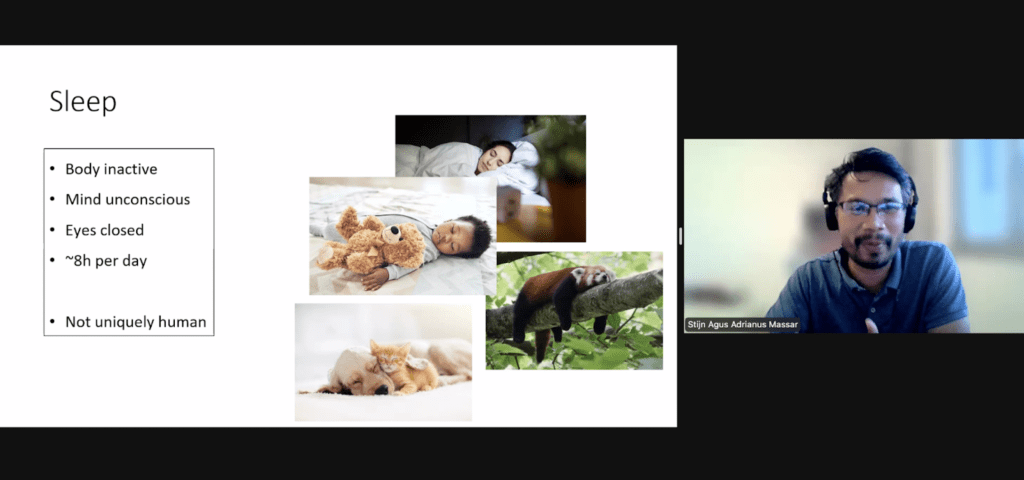At Intellect, we hold a community event designed to empower individuals to take a proactive approach in their mental healthcare called Intellearn.
In March, our Intellearn session Level Up Your Performance through Deep Sleep was hosted by Intellect’s Clinical Psychologist, Linda Rinn, with special guest Stijn Massar, Centre for Sleep and Cognition’s Senior Research Fellow, and moderated by Frank Ng, Head of Marketing at Intellect.
They dived into how important sleep is on your mental wellbeing and how restful sleep can increase your focus and productivity.
If you did not manage to catch the webinar, here are some key highlights.
1. The effects of sleep on weight gain
Linda starts the session by pointing out that “if there are disturbances in our sleep cycle caused by any kind of external factors, it can lead to disruptions in our memory, our learning abilities, our stamina, our physical health, and even our mental health and our mood overall.”
Poor sleep can lead to unwanted side effects such as weight gain, which is a common pain point.
She points out how many individuals “don’t really connect how sleep impacts our physical health, especially weight gain.”
A lack of sleep may cause dysregulation in neurotransmitters that promote hunger and feeling full. Studies show the imbalance of these neurotransmitters affects our food choices, as “we tend to want something high in carbohydrates.” The increased consumption of carbohydrates combined with the lack of sleep eventually results in weight gain.
2. How is sleep tied to mental health?
“So, not only does sleep play a vital role in our physical health, but it also affects our mental health as a lack of sleep can make you feel irritable and worn out,” says Linda.
The long-term effects can lead to the development and maintenance of mental health issues like anxiety, low mood, erratic behaviour, poor cognitive performance, declined hand-eye coordination, lowered focus levels, and overall lack of motivation. As “we’re having a hard time concentrating, to begin with, and not as motivated, it impacts us [mentally],” she explains.

Looking at the positive benefits of sleep on your mental health, Linda adds that sufficient sleep lowers stress levels, puts you in a better mood, improves memory, sharpens focus levels, and increases productivity.
3. The Angel and The Devil of your sleeping habits
An audience favourite of the webinar is the Sleep Angel and Sleep Devil of your sleeping habits, as many described it as useful and relatable. The Sleep Angel “really makes sure your sleep is amazing”. To activate the Sleep Angel, these are what you can do:
- Have short naps
- Set a bedtime alarm
- Block out light when sleeping
- Practising a self-care routine such as journaling, meditation, or praying helps you unwind
While on the flip side of things, the Sleep Devil would tempt you to do these right before sleeping:
- Have a heavy meal
- Drink alcohol
- Do strenuous exercises
These cause disruptions to your sleep and are worsened when you practice revenge bedtime procrastination, such as binge-watching shows or browsing through social media.
That being said, Linda adds that we can “bring some compassion to the Sleep Devil [because while] we all want to [engage in] the Sleep Angel” techniques, we sometimes sacrifice our sleep to gain short-term satisfaction.

4. Your brain and sleep
Stijn opened his section of the webinar by quoting Sleep Research Pioneer, Emeritus Allan Rechtschaffen, who said: “If sleep does not serve an absolutely vital function, then it is the biggest mistake the evolutionary process has ever made.”
When your brain goes without sleep, he explains, it impacts “three main points; attention, motivation, and emotion.”

Attention “was the first function that people started to study in relation to sleep deprivation.” When we are sleep-deprived, it impacts our reaction times, leading to dangerous situations like falling asleep while driving. In addition, our brain creeps into the off-task function, causing us to lose our attention and awareness.
Our motivation and emotions are also affected by sleep deprivation, which ends up encouraging procrastination. This explains why we find it hard to complete certain tasks when we do not have sufficient sleep.
5. The relationship between stress and sleep
The last point Stijn makes is that “sleep is important to your brain as you spend 1/3 of the day sleeping.” He adds that “sleep is a highly vulnerable condition, and with modern-day stress, you will find it harder to fall asleep as it activates your flight and fight response.”
Constantly practising revenge bedtime procrastination and pulling all-nighters “will affect our circadian cycles and might cause insomnia in the long run.” Avoiding sleep causes “your body to produce more of your stress-response hormone, cortisol, which causes its levels [to] be higher than usual, and this affects your sleep quality.”
So, it is essential to unwind beforehand to achieve restful sleep.
As you can see, sleep plays an important role in your mental health, brain, and stress levels. Both experts suggest improving your sleep cycle by making your bedroom pitch dark, setting the room temperature to be around 20 degrees celsius, avoiding technology use one hour before sleeping, and being consistent with your sleep and wake-up timings.
If you missed this, you may watch our webinar recording and more information can be accessed in our post-session handout.








